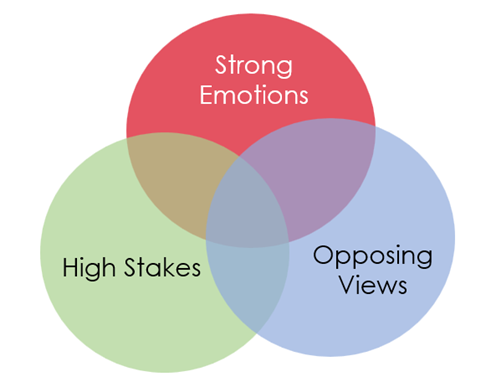“It’s such a difficult conversation! How am I supposed to deal with him?” lamented my coaching client and launched into telling me all about the latest conflict with his brother. “He’s so demanding! He wants the status and money, but won’t follow the firm’s rules and do the work that is expected of him. Since he got married, he’s much worse! She’s poisoning his thinking, but she just doesn’t understand how we work around here. I can’t get him to see sense and he just gets more angry when I try.”
“I fear he’ll damage my reputation as well as his own as he rails against the firm’s traditions. We ended up just shouting at each other! I dread our next conversation so much that I’m avoiding him. What should I do to resolve this?”
Why is it that we dread these difficult conversations and often try to avoid dealing with conflict?
I think it’s because we fear we will ‘lose’ as we don’t have the skills to handle the conversation well. Here is a simple model to help you handle difficult conversations.
Three elements together create difficult conversations

Strong emotions such as the anger in the scenario make a rational discussion impossible. Emotions feed off each other, so one person’s anger often triggers strong emotions in the other. But it is only when this is combined with high stakes and opposing views, that the conflict is truly difficult.
Take away strong emotions and what do you have? A good debate about something important.
Take away opposing views …. And the parties are aligned and strongly agreeing with each other.
Take away high stakes …. And you have a row about nothing!
This means that the recipe for dealing with difficult conversations is to minimise these three elements.
How can you calm those emotions down?
- Control of your emotion by using deep breathing techniques to tell your mind there is no threat and you can be calm. Focus your attention on something other than the emotion in the room. This enables you to stay in control. It can be something as simple as pressing your feet hard into the floor and noticing all the sensations in your toes and feet. Hold your calm state and don’t let the other’s emotions trigger you, this modelling of calm will influence them to calm down.
- Let them vent, if that’s what they need. Acknowledge what they are saying, and they will feel heard. Often this is enough for them to calm down, the anger was driven by feeling ignored.
- If the emotion seems overwhelming and not likely to dissipate soon, suggest taking a break. A change of environment can help the person to calm down.
How can you reduce the perception of opposition?
- Empathise with them. If you’ve let them vent, then acknowledge their position and show you understand their perspective to send the message that you are ready to collaborate (not compete).
- Find things in common. This could be big picture – eg. that you both want the same goal; or it could be basics – eg. you both work for the same company. Once you can show that you are similar, the opposition is diminished.
- If you can get them agreeing with you and saying ‘yes’, that’s another indicator that you’re on the same side. The more ‘yeses’ the better as it’s then difficult to say ‘no’ to your suggestion.
What about reducing the stakes?
- Put the situation into perspective. Right now it’s all-encompassing, but if you look at today in the long-term, you appreciate it isn’t so significant. Or, if you put this issue into the bigger picture of their goals, they’ll see it’s only a small part.
- Can you identify the win/win potential in this situation? Then show that it is not a ‘win all or lose all’ situation, but that both parties can win.
- Sometimes a bit of humour helps in these tense situations. Try asking, ‘What’s the worst that can happen?’ to think about potential consequences and open the mind to more possibilities.
With this model, how could my client handle his difficult conversation?
Managing the emotions and modelling calm is essential. He needs to develop patience to allow his brother the space to vent and calm down.
They do have lots in common, being brothers, and he could talk this up. Talk about their shared past and how they’d always been able to work through difficulties and they can do that again now. If that goes well, he could talk about how he wants them to have a shared future too. And have the healthy ‘I’ve got your back, and you’ve got mine’ relationship they used to have.
To reduce the stakes, he could talk about the longer-term scenario. The current leader of the firm is likely to be in position for the long term. They don’t want to waste these years and will want to look back with pride at what they have created and the legacies they are building. They both have the opportunity to contribute to the firm in different ways from different strengths.
What do you think? Could this approach reduce the difficulty in the conversation and get the brothers talking? Contact me to understand more or share your thoughts below.

